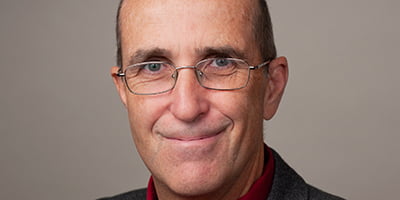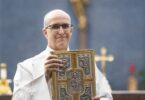
Leon Suprenant is the pastoral associate for administration in the office of the permanent diaconate. He also blogs at: www.archkck.org/blog.
by Leon Suprenant
As I turn 55 this month, I’m looking forward to all the senior discounts, especially now that my kids have outgrown the children’s menu. It also gives me an opportunity to reflect on aging.
When my family moved to Ohio in 1993, we invited my mother Eileen to live with us, as she was feeling the effects of age and heart problems. We warmly welcomed her — and her cats — into our home.
In December 1998, Mom was hospitalized with pneumonia. Complications ensued after Christmas, and she was placed on a ventilator. She spent January in intensive care and doctors were pessimistic about her recovery. I consented to endless procedures and tests on her behalf. But mostly, we were praying and waiting.
In February, Mom’s condition improved slightly, but her doctors doubted that she’d ever be discharged. Yet we pleaded, cajoled, and argued with the doctors to let her come home. On Holy Saturday, a couple hours before the Easter Vigil, our request was granted.
At home, Mom’s condition improved. We even weaned her from her feeding tube. At one of Mom’s follow-up visits, her doctor admitted that he underestimated our family’s ability to care for Mom, and, in fact, that we were able to do more for her than he could.
We moved to Olathe in 2007, and Mom was still with us. In 2008, her condition worsened, and we were so grateful to have Villa St. Francis nearby to care for her during her final months. She passed away in February 2009.
While my mom never talked too much about her faith, she manifested it to me when I was a child as she daily cared for my elderly grandmother. Given this background, it always seemed “natural” to have Mom live with us.
However, I’m aware that in welcoming Mom into our household, we made a countercultural choice. Our society often tells us that the older generation is just as inconvenient and disposable as unborn children.
With advancing age, the elderly develop an acute awareness of their own mortality, often accompanied by pain and loneliness. Yet, through faith, and especially hope, we understand the twilight of life as a passage from the uncertainties of this world to the fullness of joy that the Lord holds in store for us.
St. John Paul II wrote that honoring older people involves welcoming them, helping them, and affirming their gifts. He stressed that “the most natural place to spend one’s old age continues to be the environment in which one feels most ‘at home,’ among family members, acquaintances, and friends.”
The church calls for a widespread attitude of acceptance and appreciation of the elderly, particularly within the family, so that people may grow old with dignity.

